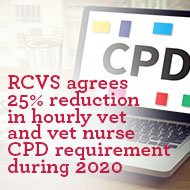
Reduction to help relieve pressure on vets and vet nurses during COVID-19 pandemic
In response to the ongoing COVID-19 pandemic and the government measures to reduce its transmission, the RCVS has agreed to reduce the annual requirement of hours of continuing professional development (CPD) that veterinary professionals are expected to undertake in 2020 by 25 per cent.
The annual minimal requirement for veterinary surgeons will be lowered from 35 to 26 hours, and requirements for veterinary nurses will be reduced from 15 to 11 hours. A 25 per cent reduction will also be introduced for those holding Advanced Practitioner or RCVS Specialist status, as maintaining these statuses requires additional hours of CPD.
The decision was made on Monday 30 March by the new RCVS Council COVID-19 Taskforce, which was established in order to make temporary policy decisions related to the pandemic. The reduction will come into force immediately, to help veterinary surgeons and nurses who are facing considerable challenges at present and in the coming weeks and months.
RCVS president Dr Niall Connell, who also chairs the COVID-19 Taskforce, said: “As a compassionate regulator, we recognise that although some veterinary professionals have seen a reduced workload, there remains immense pressure on very many members of the professions to juggle professional and family, childcare and other caring responsibilities in very difficult circumstances.
“A number of veterinary surgeons and veterinary nurses expressed concern that it may be difficult to undertake CPD at present and so, in order to give the professions some breathing space, we decided we would reduce the minimum hours required for 2020. We also recognise that some practices are having to make the difficult decision to reduce their CPD budgets this year in response to falling footfall.
“However, it is worth reiterating that CPD need not be expensive or require physical attendance at lectures, congresses or other events. There are many online providers of CPD and other resources such as articles and webinars, some of which may be free. The key is that the CPD is relevant to you and enhances your professional practice and so we would still encourage all our members to undertake CPD as and when they can.”
The policy will be reviewed regularly and may be extended further if necessary. The RCVS asks those with any questions on the new policy change to contact the RCVS Education Department at cpd@rcvs.org.uk



 The Animal and Plant Health Agency (APHA) has updated its online reporting service for dead wild birds.
The Animal and Plant Health Agency (APHA) has updated its online reporting service for dead wild birds.